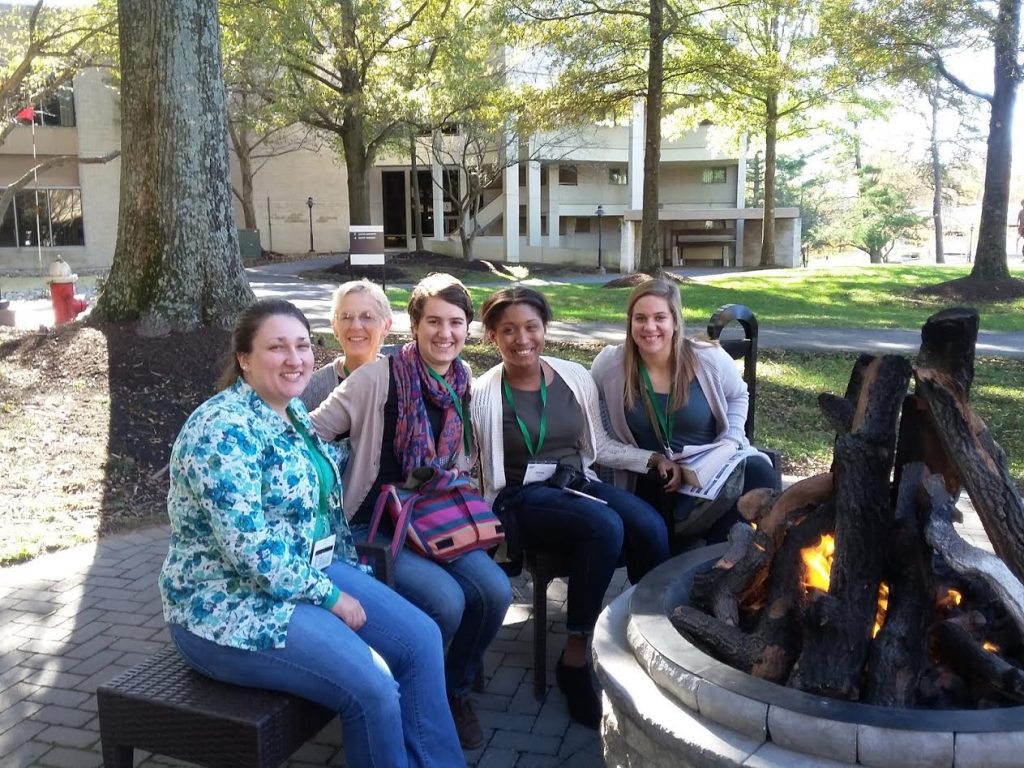In a photo taken outside the Women Doing Theology Conference last month, Eastern Mennonite Seminary (EMS) Lancaster student Karyn Nancarvis flexes her muscles and grins. Nancarvis attended the conference in Leesburg, Va., with nine other students from Eastern Mennonite Seminary campuses in Lancaster and Harrisonburg, as well as undergraduate students from Eastern Mennonite University (EMU).
Being with other women “doing theology” was a profound experience, even for this woman working on her Master of Divinity degree through EMS Lancaster. She works part-time at Akron (Pa.) Mennonite Church as interim director of children and youth ministries.

In short, she “does theology” all the time. But not always with only women and not in such a powerful space, which explains the “pumped-up” delight.
“The time spent with such a diverse group of amazing women of race, age, life stages, lifestyle choices and color brought me courage, strengthened my faith and secured a safe space to share and be engaged,” Nancarvis said.
Similar thoughts were shared by Elizabeth Witmer, a sophomore social work major and ministry assistant in the EMU residence halls.
“It was wonderful being in a place where I felt I could truly be myself, where I could express all parts that make up who I am,” she said. “That’s the first time I’ve felt that I’ve been able to do that in a church setting.
The conference is a periodic event hosted by the Women in Leadership Project of Mennonite Church USA. The students’ registration fees were sponsored by EMS, EMU Campus Ministries, and women within the Lancaster Mennonite Conference.
Professor: ‘essential’ empowerment happens at women-only events
EMU professors Nancy Heisey and Melody Pannell, EMS Lancaster faculty member Elizabeth Soto, and EMU Lancaster Associate Provost Mary Jensen also attended. Pannell, who teaches in the Applied Social Sciences Department, presented on “Womanist Theology from an Anabaptist Perspective” and “RAW Monologues: Stories from Radical Anabaptist Women overcoming sexism within the church.”
Heisey, in her first year as seminary associate dean, teaches in the Bible and Religion Department. “It is essential for women to listen to each other as we work out our understandings of God, and our relationships with churches,” she said.
The conference theme, “I’ve got the power: naming and reclaiming power as a force for good,” was a hot topic for the attendees.
Madison List, a senior religious and intercultural studies major, was inspired by a story told by Sue Park-Hur, pastor at Mountain View Mennonite Church in Upland, Ca.
“Blessing and not cursing puts the power in our courts,” recounted List. Heisey also found that to be “the most energizing story” of the weekend.
Kate Kauffman, a first-year special education major with peacebuilding minor, grew up very involved in the church. She saw a recurring theme in conference conversations : “power brings up our stories of pain … How pain is at work in how we relate to each other is something I’ve been processing a lot in sexism and in racism.”
Thobekile Ncube, a Lancaster seminary student, said that the word “power” has negative connotations for women in her home country of Zimbabwe. There, women are expected to “be silent laborers,” she said.
“That conference planted a seed in me,” says Ncube. “We can do more than what the culture expects us to do. I can encourage them [her countrywomen] to help each other. I can train them to have confidence in themselves.”
Conceptualizing the ‘doing’ of theology
Heisey has been attending Women Doing Theology conferences, through their various names, since the 1970s, and says that embodying theology has been the direction of movement. “The understanding of how women do theology has been broadened, so that it’s not just academic theology in the traditional sense.”
Elizabeth Soto, the Lancaster faculty member, said the conference was “not only a rational exercise of our brains, but an integration of our minds, body and soul … Lancaster students have shared that it was a valuable experience because they did not see themselves as women leaders doing theology before, and were afraid they would not fit in. This was clearly not the case. The concept of how women do theology was extended, and they were able to see how they are doing theology in a legitimate way in their daily life.”
Other students attending the conference included:
- Gina LaVoyce Burkhart, of Manheim, Pa., associate pastor for Landisville Mennonite Church and a seminary student in Lancaster;
- Rebekah Nolt, a seminary student in Harrisonburg;
- Christina Hershey, senior, congregational and youth ministry major and residence hall pastoral assistant;
- Janaya Sachs, senior, chemistry major, pastoral assistant;
- Alexa Weeks, junior, elementary education major, pastoral assistant.
